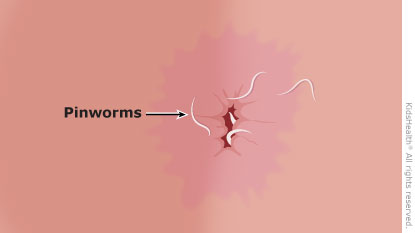Pinworms are tiny worms that can cause an infection in the intestines. The worms come out through the anus (where poop comes out) and lay eggs there. This can lead to itching and discomfort in the anal area, especially at night. Pinworm infection is common in school-age children. It is treated with medicine taken by mouth. It can take about a week for the symptoms to go away fully. Sometimes other people who live in the home need to be treated too.

Follow your health care provider's recommendations for:
- Giving the medicine. Be sure to give both doses as instructed (one dose as soon as you get the medicine, and then another dose in 2 weeks).
- Treating anyone else who lives at home.
- Using any creams or ointments in the anal area for itching.
- Checking for worms around your child's anus at night or first thing in the morning, on toilet paper after they wipe, or in their underwear. The worms are thin (like a piece of thread) and about as long as a staple.
Until your child takes the second dose of medicine in 2 weeks:
- Have your child shower every day. They should avoid baths because the eggs can get into the bath and then back into their body (if they swallow the water) or spread to others who use the same tub. Remember to:
- Use a clean washcloth and towel for each shower.
- Put clean underwear and clothing or pajamas on your child after each shower.
- Help your child avoid scratching the anal area.
- Keep your child's fingernails short and clean.
- Encourage your child to wash their hands well and often with soap and water and dry with a clean towel. This is especially important before they eat or drink and after they use the bathroom.
- Wash towels and sheets in hot water often (every day if you can).
- Wash clothing, pajamas, and underwear in hot water after each wear.

How do pinworms spread? Pinworms spread easily from person to person. When someone with pinworms scratches their anal area, the eggs can get on their hands and under their nails. The eggs then go from their hands to surfaces such as sheets, towels, tables, toys, or eating utensils. If someone touches the eggs and then puts their hand in their mouth, they can get pinworms too. Less often, eggs can spread when someone shakes out clothing or sheets, sending the eggs into the air, where they can get inhaled.
How can we prevent getting pinworms again? To prevent pinworms:
- Have everyone in the household wash their hands well and often with soap and water and dry with a clean towel. Washing hands is especially important after using the bathroom and before eating or drinking.
- Clean counters, toys, toilets, and other surfaces often.
- Keep fingernails trimmed and clean.



